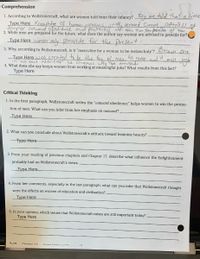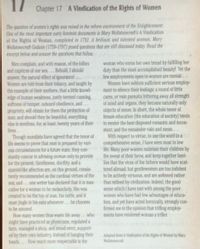Question
Question 4 pls help

Transcribed Image Text:Comprehension
1. According to Wollstonecraft, what are women told from their infancy? They are told that
Vittle
a
Type Here Knowledge of human weakness, justly termed Cunning Softness of
Temper outwand obediénce and properitty wll oblbin them from protecton of Man.
2. While men are prepared for the future, what does the author say women are advísed to provide for?
Type Here wmen mly provide fir the Dresent
Because
his rattle aud t
3. Why, according to Wollstonecraft, is it "masculine for a woman to be melancholy"?
she
Type Here s created to be the
n his tars Whenever he Chos 4 4 many
must
to Vbe amused-
4. What does she say keeps women from working at meaningful jobs? What results from this fact?
Туре Here
Critical Thinking
1. In the first paragraph, Wollstonecraft writes the "outward obedience" helps women to win the protec-
tion of men. What can you infer from her emphasis on outward?.
Туре Here
2. What can you conclude about Wollstonecraft's attitude toward feminine beauty?
Type Here
3. From your reading of previous chapters and Chapter 17, describe what influence the Enlightenment
probably had on Wollstonecraft's views.
Туре Here
4. From her comments, especially in the last paragraph, what can you infer that Wollstonecraft thought
were the effects on women of education and civilization?,
Type Here
5. In your opinion, which issues that Wollstonecraft raises are still important today?
Туре Here
7-12
Chantor 17

Transcribed Image Text:17 Chapter 17 A Vindication of the Rights of Women
The question of women's rights was raised in the reform environment of the Enlightenment.
One of the most important early feminist documents is Mary Wollstonecraft's A Vindication
ol the Rights of Woman, completed in 1792. A brilliant and talented woman, Mary
Wollstonecraft Godcin (1759-1797) posed questions that are still discussed today. Read the
excerpt below and answer the questions that follow
Men complain, and with reason, of the follies
and caprices of our sex...Behold, I should
answer, the natural effect of ignorance!..
Women are told from their infancy, and taught by
the example of their mothers, that a little knowl-
edge of human weakness, justly termed cunning,
softness of temper, outward obedience, and...
propriety, will obtain for them the protection of
man; and should they be beautiful, everything
else is needless, for, at least, twenty years of their
lives....
Though moralists have agreed that the tenor of
ife seems to prove that man is prepared by vari-
Ous circumstances for a future state, they con-
stantly concur in advising woman only to provide
for the present. Gentleness, docility, and a
spanie-Hike affection are, on this ground, consis-
tently recommended as the cardinal virtues of the
sex, and ...one writer has declared that it is mas-
culine for a woman to be melancholy. She was
created to be the toy of man, his rattle, and it
must jingle in his ears whenever...he chooses
to be amused.
How many women thus waste life away..who
might have practiced as physiclans, regulated a
farm, managed a shop, and stood erect, support-
ed by their own industry, instead of hanging their
heads.... How much more respectable is the
woman who earns her own bread by fulfilling her
duty than the most accomplished beauty! Yet the
few employments open to women are menial....
Women have seldom sufficient serious employ-
ment to silence their feelings; a round of little
cares, or vain pursults frittering away all strength
of mind and organs, they become naturally only
objects of sense. In short, the whole tenor of
female education (the education of soclety) tends
to render the best disposed romantic and incon-
stant; and the remainder vain and mean....
With respect to virtue, to use the word In a
comprehensive sense, I have seen most in low
life. Many poor women maintain their children by
the sweat of their brow, and keep together fami-
lies that the vices of the fathers would have scat-
tered abroad; but gentlewomen are too indolent
to be actively virtuous, and are softened rather
than refined by civilization, Indeed, the good
sense which I have met with among the p0or
women who have had few advantages of educa-
tion, and yet have acted herolcally, strongly con-
firmed me in the opinion that trifling employ-
ments have rendered woman a trifler.
Adapted from A Vindication of the Rights of Woman by Mary
Wollstonecrat.
Expert Solution
This question has been solved!
Explore an expertly crafted, step-by-step solution for a thorough understanding of key concepts.
This is a popular solution
Trending nowThis is a popular solution!
Step by stepSolved in 2 steps
